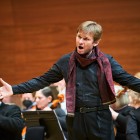Miserly Knight 2022Scottish Opera
Read more about the opera Miserly Knight
Scottish Opera gave a double bill, in concert, of two of Rachmaninov's operatic trilogy back in 2018. Having had success with Aleko and Francesca da Rimini, it was hardly surprising that their Russophile conductor, Stuart Stratford, should have elected to complete the trio with The Miserly Knight, another distinctly serious piece. This most welcome and substantial work formed the first part of a double bill completed by Stravinsky's brief farce Mavra.
Given the huge effort required to plan, rehearse and perform this programme, it seemed disappointing that it should only receive a single performance. It was, however, enterprising of the company to mount the event in Perth - easily accessible from four other cities - Dundee, Stirling, Edinburgh and Glasgow. Even Aberdeen and Inverness were within range by car or train.
However the serious circumstances of this particular performance, influencing all present in the concert hall, are worthy of special note. The context must therefore be made clear. On 24 February, Ukraine was invaded by Russian military forces. The long-serving Russian President, Vladimir Putin, seems determined to reinstate elements of the old Soviet Union by bringing the ancient and recently independent nation forcibly back under Russian control.
The process has seen a violent struggle already three weeks old and at the time of this performance with no end in sight. Russian aggressors are currently laying siege to major centres of the Ukrainian population, including the ancient capital, Kyiv. By the evening of the concert several million citizens, largely women and children, have been forced to take refuge in neighbouring states, most notably Poland. While no NATO member states were directly under attack, so could take no active military role, they were able to supply Ukraine with much equipment and supplies, including military aid. Unprecedented economic sanctions have also been put in place. The near-universal condemnation of the conflict led to a huge voluntary effort throughout Europe to help the besieged Ukrainians.
This then was hardly an auspicious time to introduce little-known aspects of Russian culture to a potentially unsympathetic audience.
A most welcome leaflet penned by Scottish Opera's General Director, Alex Reedijk, underlined the fact that individual Russians were in no way to blame. ''Please join us in making sure our artists this evening - British residents hailing from many nationalities, including Russia and Ukraine - feel most welcome.''
Reedijk added a telling reminder that Rachmaninov was a great artist and educator who founded the Kyiv Conservatory, while Stravinsky's mother was Ukrainian and father a famous bass who sang with the Kyiv Opera.
To add to the atmosphere, the evening began with the audience standing for a rousing performance of the Ukrainian national anthem, greeted with universal applause.
So what of the performance?
Of the cast of five, all male - two tenors, two baritones and a bass - the original line-up included two British and three native-Russian speakers. Two of the latter were resident in the UK. Only Alexander Krasnov dropped out. The title role is not standard repertoire for most baritones. It was thus extremely fortunate that Roland Wood, the company's recent Falstaff, was available (preparing Don Giovanni for a May launch) and willing. His Russian is, it seems, excellent, and he was able to learn the Baron's part in a week. While Wood referred to the score occasionally, everything seemed comfortably in place and his contribution seemed thoroughly idiomatic.
The leading tenor role of the Baron's son was taken by Alexey Dolgov, already seen at the Met and Covent Garden, originally from Siberia, but now putting down roots locally. With Scottish Opera this was his third appearance in a concert rarity, following Iolanta and Silvano. The role of Albert is a demandingly dramatic one, and he met all its requirements with ease. He was the only soloist also required for Mavra - a very different part.
The second tenor role - the Jewish moneylender Solomon - is a character part, quite high lying. It was ideally suited to a rare appearance on home turf by Alasdair Elliott. Elliott has worked with Scottish Opera from time to time over the past thirty years, including Mime in the Ring, and it was good to be reminded of his excellence.
Although only singing in the last scene, the Duke is a prominent part, making an unsuccessful attempt to reconcile father and son. The second native Russian, Alexey Gusev, has been based in Glasgow since his student days at the Conservatoire, beginning in 2010. For this evening he was also credited as Language Coach - so can perhaps take a share in Roland Wood's success. The final role, of Albert's servant Ivan, needs one of those black-toned Russian bass voices, for which John Molloy was ideal. The fact that he could use his height to dominate the stage no doubt helped.
The direction by Laura Attridge was extremely simple but effective. With five chairs spread in a semi-circle across the stage, the five black-clad figures slipped in and out of character, holding the miser's money boxes, or delineating scene changes as required. She perhaps had more opportunity for display in the Stravinsky.
The orchestra was on superb form from the off, with a long dark-toned prelude to set the scene. Much of the orchestration is reminiscent of the composer's dark-toned symphonic writing at its best, including The Isle of the Dead.
Does the opera deserve a full staging? It is hard to tell, but based on the quality of this performance an excellent case was made for it.
A few days after this event Vladimir Putin complained that we in the West were trying to 'cancel' Russian culture in the way that the internet was being used against people who were disliked for some reason or other. Clearly Putin and his advisers were not aware of events in Scotland - or at least in Perth.

